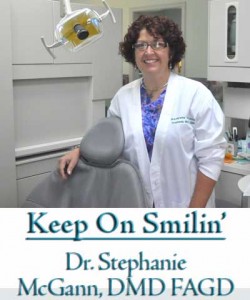At so-called ‘dental mills’ PBS report airs concerns that profit trumps patient needs
By Dr. Stephanie McGann, DMD FAGD, Columnist, The Times
 Once upon a time – a dentist opened up an office and provided patient care. Satisfied patients referred their friends and families and his (or her) business grew. These dental practices (like mine) answer only to their patients. A private practice is owned by the provider of care. While private practices can be of varying sizes the practice is owned by a dentist and that dentist is responsible for the care of his or her patients.
Once upon a time – a dentist opened up an office and provided patient care. Satisfied patients referred their friends and families and his (or her) business grew. These dental practices (like mine) answer only to their patients. A private practice is owned by the provider of care. While private practices can be of varying sizes the practice is owned by a dentist and that dentist is responsible for the care of his or her patients.
In the United States today, there are a number of new, large corporate dental chains and franchises offering lower fees and quicker appointments than private practitioners. Recently, one of these companies was the focus of the PBS television program “Frontline.” I believe patients should know when their dentist answers to a corporate boss who dictates how much they need to bill out in a day — despite the fact that in all but four states, including Pennsylvania, it is illegal for a non-dentist to own a dental practice. The Frontline report “Dollars and Dentists” should be a wake-up call as to the unscrupulous tactics used by some corporate dental chains to separate patients from their money.
These companies get around the ownership issue by claiming that they offer business management and marketing solution to dentists, and don’t own the practice. The companies own the building, hire the staff, determine pricing and sales goals and can, in essence, fire the dentist if they don’t make the numbers, so it’s up to you to decide who actually “owns” what.
Corporate dental practices, answer only to their investors — often large hedge funds, looking to squeeze as much profit out as possible before flipping the company. While most of the attention has been focused on only one major dental chain, there have been dental offices opening in Wal-Mart as well as chains in most major shopping malls. The recent article by the Center for Public Integrity found patients who have been pressured into accepting treatment they could not afford and coerced into signing up for long term financing contracts.
This type of dental practice hires large numbers of dentists and personnel to work in their stores. The dentists are required to “make their numbers” meaning that the care they give has to meet the corporate financial guidelines. Dentists, who don’t measure up, lose their job. Many of these dentists are recent graduates, who along with their degree may have nearly a half million dollars in debt. To meet these mortgage-like student loan payments the graduates take these jobs that promise great salaries, new modern facilities and a steady stream of patients. Corporate dental businesses can invest in nationwide marketing and advertising that a private practice (a small business) could never afford. Some of the practices are sold as franchises and the franchisee (dentist) has to abide by all of the guidelines as part of the franchise agreement.
While it is impossible to comment on the quality of care, the focus on profit as the main goal of treatment gives me cause for great concern.
As a patient it means only the most lucrative (i.e. expensive) treatment plans are presented. High-pressure sales tactics and slick talking front office people convince patients that the treatment is urgent and get the interest–free financing applications signed quickly. I feel sick when I hear of a senior citizen who was charged over $1200 for a filling. One patient’s bill showed he had all sorts of treatment completed (and paid for) on teeth that were slated for extraction. There have been reports that some corporate practices own their own overseas dental labs and require the employee dentists to prescribe only from that laboratory. The turnover rate is huge at these dental “mills” so that when a patient returns they don’t necessarily see the same dentist. It’s not surprising that a large number of employees get their personal dental care elsewhere.
As a private practice dentist for more than 20 years, I know that for the most part my patients trust my recommendations. When there are treatment options we discuss pros and cons and of course, “are the benefit worth the fee?” My patients know that I stand behind my work. The influx of corporate dental practices in this area is happening at an alarming rate. I cringe when one of my patients is lured to a corporate practice because they work with their insurance. While getting the same thing for a better price is good consumerism. Getting taken advantage of is not.
While each patient care experience is unique, think twice about the type of practice you are visiting. Private practices survive on the goodwill and referrals of their patients. If you’re not sure if your dentist is a private practice, just ask.
Center for Public Integrity report
Dr. Stephanie McGann is a resident of the Unionville area and along with her partner, Dr. Marie Scott, operates The Brandywine Smile Center, a family-friendly dental practice in Concordville. She is a Fellow of the Academy of General Dentistry.




